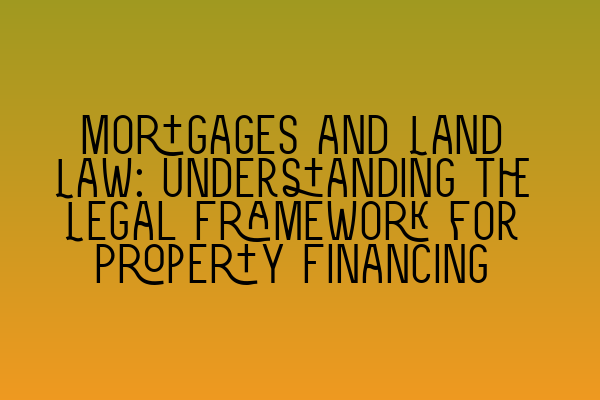Are you considering purchasing a property but are unsure about the legalities involved in property financing? Don’t worry, you’re not alone. Mortgages and land law can be complex and confusing for many individuals. However, understanding the legal framework for property financing is essential to ensure a smooth transaction and protect your interests.
In this blog post, we will delve into the key concepts of mortgages and land law and provide you with a comprehensive overview of the legal framework surrounding property financing. Whether you’re a first-time buyer or a seasoned investor, this article will equip you with the knowledge necessary to navigate the intricacies of property financing successfully.
Understanding Mortgages: A Brief Overview
Let’s start by defining what a mortgage is. A mortgage is a legal agreement between a borrower (often referred to as the mortgagor) and a lender (commonly known as the mortgagee). The lender provides a loan to the borrower, allowing them to purchase a property. The property itself serves as security for the loan, meaning that if the borrower fails to repay the loan, the lender has the right to sell the property to recover the outstanding debt.
Mortgages play a crucial role in property financing, enabling individuals and businesses to acquire properties that they may not have been able to afford otherwise. It is essential to understand the legal implications and obligations associated with mortgages to make informed decisions and protect your rights as a borrower.
Key Principles of Land Law
Land law encompasses a set of legal principles and rules that govern the ownership, use, and transactions of land and properties. Understanding the key principles of land law is crucial when entering into any property-related transactions, including mortgages. Let’s explore some of these principles:
1. Legal Title and Registered Land
Legal title refers to the ownership rights and interests in a property. In the United Kingdom, land law operates on the principle of registered land, where details of ownership and interests in land are recorded and maintained by the Land Registry. When purchasing a property, it is crucial to investigate the legal title and ensure that it is registered and free from any encumbrances or third-party interests.
For a more in-depth analysis of the significance of registered land and legal title, we recommend reading our article on SQE Contract Law: Analyzing Landmark Cases and Influential Judicial Decisions.
2. Restrictive Covenants and Easements
Restrictive covenants and easements are legal obligations or rights that may affect a property. Restrictive covenants are contractual obligations imposed on the owner of the property, which restrict or regulate certain activities or uses of the property. Easements, on the other hand, are rights granted over another person’s property, such as rights of way or rights to access utilities. Understanding these legal concepts is essential to ensure compliance with any existing obligations and to prevent any potential disputes.
For a detailed exploration of the intricacies of restrictive covenants and easements, we recommend reading our article on Understanding Contractual Capacity: Rights and Limitations.
3. Priority of Interests
In property transactions, the priority of interests becomes crucial. The priority determines the precedence of various interests in a property when multiple claims or rights exist. Understanding the rules and principles that govern the priority of interests is essential when dealing with mortgages, as it ensures that the lender’s security interest is protected and has priority over other claims.
To test your knowledge of the priority of interests and other land law concepts, try out our Interactive SQE Mock Tests for Contract Law: Test Your Knowledge.
The Role of a Solicitor in Property Financing
Given the complexity of mortgages and land law, it is highly advisable to seek the assistance of a solicitor who specializes in property law. A solicitor can provide invaluable guidance throughout the property financing process, ensuring that your rights are protected, and all legal obligations are met.
At SQE Property Law & Land Law, our team of experienced solicitors is dedicated to assisting individuals and businesses with their property financing needs. Whether you require legal advice on mortgage agreements, property purchase contracts, or conveyancing matters, our team is here to help.
For more information on our services and how we can support you in your property financing journey, we invite you to explore our website and consider joining our upcoming SQE Contract Law webinars for expert insights and guidance.
To master the essentials of contract law and enhance your understanding of legal frameworks, we also recommend our comprehensive SQE preparation course, SQE Prep: Mastering the Essentials of Contract Law.
Conclusion
Mortgages and land law form the backbone of property financing. Understanding the legal framework surrounding property transactions is essential for borrowers and lenders alike. By familiarizing yourself with key concepts such as legal title, restrictive covenants, easements, and priority of interests, you can navigate the complexities of property financing with confidence.
Remember, seeking the assistance of a solicitor who specializes in property law is highly recommended. At SQE Property Law & Land Law, our team of dedicated professionals is ready to support you in all your property financing needs. Contact us today to discuss your requirements and embark on a successful property financing journey!
